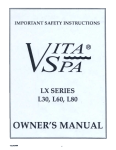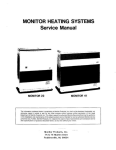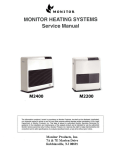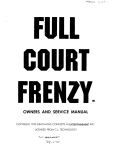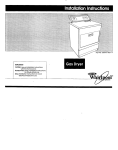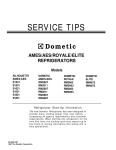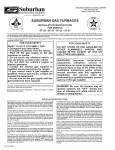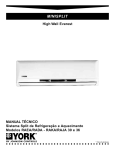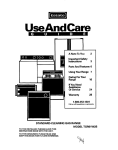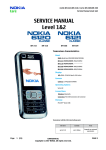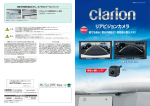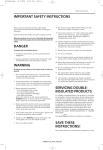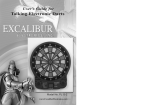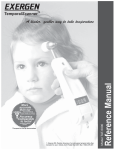Download Service Manual
Transcript
MONiTOR HEATING SYSTEMS Service Manual MONITOR422 MONITOR 2 2 MONITOR 21, . MONITOR 441 MONITOR 41 MONITOR 40 MONITOR HEATING SYSTEMS Section 2: Installation I 1X. OD cobper Tubing I NOTE: Fuel tank musr be a minimum 3 feet away from flue pipe. MONITOR HEATING SYSTEMS Section 3: Operation - Circulation Fan Output : 388 cubic feet:min. - Fuel source : Remote, separate tank 3-1 INTRODUCTION Monitor is an easy-t~operate vented kerosene heater. Routine operation features high BTU output. automatic adjustment of room temperature, low fuel and power consumption, and choice of automatic or manual heater operation. - Potential heating area : 900-3200 sq. feet 'The energy from the combustion process IS released in the form of heat and vaporized water. Normally. heating systems discharge water from combustion to the atmosphere without condensing it. This 93% efficiency rating means that. assuming the water cannot be condensed, 93% of the heat produced by the combustion process is recovered. Assuming the water can be condensed, the efficiency is 87%. This section provides all information necessary to operate the Monitor Heating System. All operation procedures specified should be performed in the order in which they are described. 3-2OPERATING SPECIFICATIONS The following specifications apply to the operation of the Monitor 441 and the Monitor 422. NOTE: Monitor 441 Rated Efficiency (as applied to kerosene heaters): 93%' Rated Efficiency (as applied to central heating systems): 87% Power Consumption : as follows - HlGH Actual effective heatirig area depends upon numerous factors such as type and severii of climate, type of dwelling construction, condition of dwelling, and thickness and effectiveness of dwelling insulation. Table 3 1 lists Monitor 641 performance specifications at various user-selected heat output settings. MEDlUMHlGH MWUMLOW LOW IGNITION BUR4 BURN 340watts 65watls matts BURN 58- BUFIN 58wam Table 3-1 HEATER PERFORNlANCE SPEUFlCATlONS Ssthng Specification I Rating Heater Output/hr. I 16,200 I 15.000 I Medium Medium Low Low I ZI,MX) I, 19.W I High High 1 33.900 I 3.500 I I 43.cm 1 40.0OO I 0.12 0.16 ,025 0.39 &hrs/day burntime (5-gal. tank) 52days 3.9days 25daP 2.WaYs Bhrs/day burntime (55gal.tank) 57.3days 27.5days 2Y.Mays Continuous-use bumtime (55-gal.tank) l9.ldays 14.3days Q2days 72days 2BS.5days 214.fflays 137.5days 107.8days 955days 71.6days 45.8days 35.9days Fuel Consum~tion(~al/hr) 1 Bhrs/day bumtirne (275-gal-tank) Continuous-use bumtime (275-~al.tank) 43days , ( I , MONITOR HEATING SYSTEMS Section 3: Operation Monitor 422 Rated Efficiency (as applied t o kerosene heater): 93%' Rated Efficiency (asapplied to central heating system):0?% Power Consumption : as follows - - lGmm HIGH BURN - Circulation Fan Output : 176 cubic feet/min - Fuel source : 1.32 U.S. gal., separate tank - optional Potentional heating area : 600-2000 sq. feet Table 3 2 lists Monitor 422 pertormance specifications at various user-selected heat output set tin^. MEDIUMHIGH MWUMLOW LOW BlJW BUFIN BURN 5150watts 50watts TaMe 3-2HEATER PERFORMANCE SPECIFICATIONS Setting Specification Low Med~urn Low Med~um High High Rating 9,600 11,700 17,400 22,000 Heater Output/hr. 8,900 10.900 16200 20,400 Fuel Consumption (gal/hr) 0.07 0.09 0.13 0.164 Bhw/day bumtime ti32-gal. tank) 2.4days 1.Bdays 1.3days 1.OdayS Continuous-use burntime (1.32-gaI.tank) 18.9hrs. 14.7hrs. 102hrs. 8.0hrs. Bhrs/day bmtime (55-gal.tank) 982days 76.4days 52.9days 41.9days Continuous-use burntime (55-gal.tank) 32.7days 25.5days I7.6days 14.Ddays NO= Capsule tank cannot be used in Conneeticut and Massachusetls. MONITOR HEATING SYSTEMS Section 3: Operation, 3 3 OPERATING CONTROLS AND INDICATORS Several controls and indicators are used to operate the heater and to monitor its performance as follows: Figure 3-1,INDICATORS 11 12 13 14 15 OPERATION 21 22 23 10 17 18 19 20 FIGURE AND lTEhtl NO CONTROL OR INDICATOR FUNCTlON Figure 34,hem1 RUN Indicator Light Light to indicate that power has been apllied to heater. Illuminates when operation ON/OFF pushbutton switch is pressed to position ON Figure 3-1, hem2 AUTO Indicator Light Lights when heater runs in automatic mode. AUTO, RUN, and appropriate BURNER STATUS Indicators are illuminated simuttaneously if heater is burnina. Figure 31, Item3 ECONOMY PLUS Indicator Light Lights when heater runs in Economy Plus mode. Figure 3-1, hem4 Empty Indicator Light In case af using the cartridge tank,when the fuel is empty, EMPlY Indicator Light blinks. This LigM is not provided with Monitor 441. Figure 3-1. Item5 BURNER STATUS indicator Lights Light in accordance lows: H B a t w High Medium High Medium Low Low with heat output as fd- Light Pattern Bindicators-ON 6indicato+ON 4indic.N Zndicators-ON MONITOR HEATING SYSTEMS Section 3: Operation FIGURE AND ITEM - NO CONTROLOR INDICATOR - FUNCTION - - Figure 3-1, ttem6 TEMP-Indicator Light Figure 3-1,Item7 AM Indicator Light Figure 3-1. kern8 PM Indicator Light Figure 3-1, hem9 Digital Display Indicates SET and ROOM temperature when heater is running, and indicates time when heater is Off. . Indicates time and temperature for automatlc operation setting. Figure 3-2, Item10 TIMER SELECTOR The automatic function allows the programming of different temperatures for different times of the day. Two, three or four settlngs can be used. push-button switch Figure 3-2. Item11 CLOCK SET Indicator Light Lights when heater is running and ~ i ~ i & l Window is showing the temperature. Allows programming of current time when illuminated. NOTE: Prior to programming current time, Digital Display shows 88:88. IMPOKTAKT: Oncs c m t time has been pmgrarnmed, press the SET p t s h b b n switch within 60 #cond6.0themise do& dbp b y will mvsnt to previously progtammed time, If any. Figure 3-2.Item72 1st Indicator LgM Allows programming of first automatic time and temperature selection when illuminated. When programmed, heater automatically operates at specified time and temperature 0.e. 6: 00 am., 70'F), if set for AUTO, providing that heat81 has been .set for automatic mode of operation. TiME TEMP,HOWUP), MINEDOWN) and SET push-button switches are used to prp gram first operated time and temperature. IMPORTAKI. Onca time and temperature have bssn prograramsd, the SET p u s M d b n mwttch must be pres8ed with in %seeon& Ohemisel time and tempera ta will rWMt to pmviwsty programmed time, Iany. When this Light illuminates, 1st presently prct grammed time and temperature displayed. Figure 32,ttem73 2nd Indicator Light of second automatic time and temperature selection when illumiAllows programming nated. MONITOR HEATING SYSTEMS Section 3: Operation - -~ FIGURE AND IEhA NO CONTROL OR INDICATOR -- - Figure 3-2, ttemi4 3rd Indicator Light Figure 32,ttem15 4th Indicator Light FUNCTION - - - Programs 3rd automatic heater operation as same as 1st Indicator Light. Programs 4th automatic heater operation as same as 1st Indicator Light. TIME push-button switch This switch is used to set time and change display over. Figure 3-2,Item17 TEMP push-button switch This switch is used set temperature and change display over, in 2 degree increments. figure 32,Item18 HOUR/UP, MINUTE/DOWN repetitiveaction push-button switch Figure 3-2,Item16 . Programs time or temperature. NOTE: Each time push-button switch is pressed, the digit advances in increments of one digit, If push-button is pressed and held, the digits are advanced repetitively. Figure 3-2.Item19 SET push-button switch 'Sets' time and/or temperature. If this control is not pressed after time and/or temperature have been programmed, the time and/or temperature programmed (as indicated by display window) will not be accepted, and will revert to previously programmedtime and/ w tempemre. figure 32,Item20 CLEAR push-button switch Erases any programmed time and temperature. When cleared, time and/or temperature previously pmgrammed and displayed disappear@) frwn window. IMPORTANT: Both current time and automatically programmed tims(s), tampamture(r) will have to be reprogrammed tf .kcblal operation is interrupted by power failure or by dbcocmecting heater plug fmm wall outlst beyond 5 mkurbss nthh otarrs, the h t o r will go brto MANUAL mode of opemtion and maintahrr#wntwnpsmtureacwfding to ttm setting bmperature you've #leded by using the Jide sdector for the rseet tempemmatthekwarrigtlt hand Jde ot ths cabinet Figure 3-2,kern21 ON/OFF push-button switch ON position (push-button is 'in')applies power to the unit. When this occurs, the RUN indicator lights to indicate that heater operation has begun. OFF position (push-button is 'our) remove power fmm the heater. All circubexwpt for Clock and Air Row are shut down. - MONITOR HEATfNG SYSTEMS Section 3: Operation RGURE AND IT34 NO CONTROL OR INDICATOR FUNCTiON Figure 3-2,Item22 AUTO push-button switch Places heater in automatic mode of operation. AUTO indicator lights to confirm automatic operation. Assuming that the heater has been properly programmed and heater is in ON position, heater will operate automatically. When pressed again, AUfO indicator goes out and then heater will operate in MANUAL mode. During rrianual operation, the user turns heater ON and OR, at will. When AVTO is disengaged, the unit will operate om .a manual.temperature determined by the AUTO setting for that time of day. ECONOMY P U S push-button switch Places heater in Economy Plus mode of operation. ECONOMY PLUS indicator lights to confirm Economy Plus operation. When pressed again, ECONOMY PLUS indicator goes out and then Economy Plus mode will be cancelled. NOTE: Economy Plus mode is accepted only in the MANUAL mode. Figwe 3-2,item23 , 3 4 PRE-OPERATIONCHECK UST After heater installation. but prior to Monitor heater start-up, inspect the system for operational readiness. The following check list specifies those items that should be inspected on a routine basis: Check that the Monitor heater is plugged into wall outlet (I20 Vac, 60 Hz) Verify that adequate supply of kerosene is available in fuel tank Confirm that fuel is free of water M Other contaminants Check fuel tank for good operating condition; it must be free of rust, conosion, and/or leaks inspect fuel Line for signs of leaks, loose connections, cracks, air pockets or blockages Confirm that Fuel Valves on Fuel Tank and Fusible Link Valve are open so fuel can flow freely Outside dweliing, check area immediately around Flue Pipe for combustibles or obstntctions to.free air circulation Inspect Air Line for cracks, loose connections or blockage Check Exhaust Line for cracks, toose ComaCtions or blockage ~t rear of hater, verifythat air flaw to tk Air Circulation Fan is not blocked Inspect dwelling interior and confirm that immediate area near heater is free of combustible and obtects that might interfere with free air flow. .r Make certain that Heat Sensor is not exposed to drafts, direct sunlight, nor direct heat from the Monitor. .I Confirm that heater is level If this inspection reveals any system deficiencies, correct the problems before operating the heater. 3-5 OPERATION Operation of Monitor heater can be controlled manually by the user, or run automatically'by the microprocessor. Paragraphs.3-6through 3-10 provide the details of heater start-up, operation, and shutdown. The controls and indicators illustrated by Figure 3-1 and 3-2 are used to operate the system and to monitor the heater's performance. MONITOR HEATING' SYSTEMS Section 3: Operation 3-6MANUAL HEATER OPERATION Operation of the heater is under the direct control of the user (heater will not operate automatically),The heater will, however, automatically respond to changes in room temperature signaled by the Heat Sensor to maintain the temperature of the room at a comfortable level. NOTE: Resetting the Fuel Constant Level Valve is necessary only if the heater is being started for the first time, hasn:t been used for an extended period of time, or if tank has run empty. If priming is unnecessary skip to step 2. m. 1. Decreasing electrical consumption by decreasing the frequency of ignition cycles. 2. Reducing heat loss during the prepurge and postpurge cycles. 3. Reducing inefficient combustion associated with start up and shut down. 4. Prolonging component life by decreasing expan. sion and contruction of internal parts. NOTE This feature could be compared to driving Prime the Heater Gently press and release the Fuel Constant Level Valve Reset Lever four or five times. ' STEPZ: Select Manual Operation If heater operation is in AUTO mode, press the AUTO push-button switch and change Auto to Manual made. IMPORTAW. In case no temperature is mat, tsmperature will automatically k n t at the wtting temperature nlect.d by using lhe slide selectot for the m8et temperature. Turn Monitor On Press me 0N:OFF push button switch to position ON. The RUN indicator light illuminates to indicate that power has been applied to the instrument and tte heater is cycled for manual mode of operation. IbSlRCTlONS FOR ECONOMY PUlS MODE To engage the economy plus mode. simply press down !he button labeled -nomy P'rrs's to disengage press again. NOTE: Operation switch must 3-7 AUTOMATIC HEATER OPERATION Automatic operation is established by programming the time 'temperature settings for specific times. On a daily basis, a maximum of four time -temperature senlngs can be programmed. If. subsequently, it should be desired to switch to manual mode of operation, the changeover can be made at any time. Proceed with automatic mode of operation in the following manner. STEP3: Select Temperature Setting Press the TEMP push-button switch and press either the UP or DOWN push-button switch to set me digital set room temperature indicator to the desired temperature, and then press the SET pushbutton switch. -4: an automobile in stop and go traffic (regular mode) versus highway driving with cruise control engaged (Economy Plus mode). be 'OW end in STEPI: Program Clock for C u m ! Time A Press the nMER SELECTOR push-button switch,at which time the CLOCK SET indicator light will illuminate. 8. Press HOUR push-bunon switch to program current hour on the Clock. IMPORTANR Be wre to set clock tor AM or PM, as appIopMld NOTE Both hour and minute digits on Display Window are advanced in in-mments of one by pressing the a~pro~riate push-button switch one time for each digit; digits can also be advanced repetitively by pressing and holdlng the appropriate push-button swim. C. Press MINUTE push-button switch to program the cunent minutets) on .Clock D. immediately after programming cunent time in t e r n of hours and minutes, press the SET push-button switch. MANUAL mode. This feature minimizes the 'ON ' and ' O f f cycling of the unit by allowing it to overshoot the set temperature by 12 degrees instead of the n m l 4 degrees. The advantages of this feature are to increase the' overall efficiency ofthe unit by. 29 STEP2: Program the lst Time Temperature A Pressing the TIMER SELECTOR push-button switch will illuminate the 1st indicator light 8. n m pust-+bunon switct~. MONITOR HEATING SYSTEMS Section 3: Operation C. Press HOUR and MINUTE push-button switches to program 1st desired time. IMPORTAKT: Be sure to set the dock AM or PM, as appropriate. Immediately after programming the 1st desired time. press the SET push-button switch. This step must be completed within fifteen seconds after programming the time. E, Press TEMPpush-button switch. F, Press UP and for DOWN push-button switch(es) to program 1st desired temperature. G, Immediately after programming the 1st desired temperature. Pressthe SET push-button switch. This step must be completed within fifteen seconds after programming the temperature. D. STEP3: Program the Remaining Times By pressing the TIMER SELECSTOR push-button switch again, the 2nd Indicator Light will illuminate, at which time the 2nd setting can be programmed. Press again to set 3rd and again to set 4th. IMPORTAHT: The SET push-button swnch must be pressed attar each setting b lock into memory. Should heater power be interruptad by a power failure or by disconnsction of h e power owd beyond 5 minutes, heater roveris to MANUAL operation, and all AVTO programming ts e d STEP4: Salad Automatic Operation Press AUTO push-button switch. The AUTO indicator light will illuminate. Turn Monitor ON Press ON/push-button switch to position ON. -5: The RUN indicator light will illuminate to indicate that power has been.applied to the heater. F m this point, heater operation is as follow example. S m : Reprogramming Current Time (ifnecessary) A. .Press the TIMER SELECTOR push-button switch to illuminate the CLOCK SET indicator light 8, Press HOUR and MINUTE push-button switches to program new current time. Set applicable time by watching Clock display. C. Press SET push-button switch. IMPORTANT: If SET push-button switch is not pressed, wrrent time will revert to previously programmed time. STEP2: Reprogramming Automatic Operation A. 8. C. D, E, F, G, H, I. Press the TIMER SELECTOR push-button switch to illuminate the appropriate indicator light. (Ist, 2nd, 3rd, or 4th) Press TIME push-button switch. Press CLEAR push-button switch. Time displayed on window will disappear. Using HOUR and MINUTE push-button switches program new desired time by watching the Display Window. Press SET push-button switch. Press TEMP push-button switch. Press CLEAR push-button switch. Set Temperature displayed on Window will disappear. Using UP and DOWN push-button switches program new desired temperature by watching the Display Window. Press SET pusbbutton switch. 3-9 HEAT SENSOR Heat Sensor islocated on the rear of the cabinet. It is recommended to leave the aensor in its original mounted position. However should relocation be necessary, choose a location for the sensor that is not in the path of direct sunlight drafts or the flow of w m air f m the heater. Loosen the screw and release the sensor from the mar of the cabinet Fasten the sensor to Zhe wall with the screw. 3-10 MONITOR SHVrOOWN A simple one-step procedure Q utilized the Monitor. shutdown Press ON/OFF push-button switch to position OFF, the RUN indicator will extinpuish. -ANT: 34 REPROGRAMMHG THE MONerOR HEATER On occasion. it m y be ne-ry to rf3PrOgm the Monitor. Remagramming is pertwmed as specified belaw: Orrcs h a t e r has shut down, It annot bs rsrtarted until poa-putge eyda has been canpletd. If ONIOFF switch is k R in posttion ON, Monttor ommtiar will automatically resbrt m-pie- m p u r g a . MONITOR HEATING' SYSTEMS Section 3: Operation 3-TI ,OUT OF N E L During either manual or automatic operation of heater. fuel in the tank may be depleted. , The Monitor (in case of using external fuel tank) is known to be out of fuel when all of the following symptoms are present - Burner Status indicator lights blink. - Absence of flame (visually verified through view plate on wall of Combustion Chamber). m.Tum Heater OFF Press ON/OR switch to O R . STEP2: . Flll Fuel Tank A, 5. C, . D. Close shut-off valve at outlet of ~ u eTank. l Drain Fuel Tank (from battom; if possible) to remove all condensation, debris, and old fuel. Fill Fuel Tank with fresh, crystal clear kerosene. Upon completion of stepC. open shut-off valve which was closed in stepA above. STEP3: Turn Heater ON Press ON!OFF switch to ON. Proceed with normal heater operation. The Monitor 422 (in case of using capsule .fuel tank) is known to be out of fuel as follows: When the E M P N indicator light illuminates and flashes, a buaer will sound for twenty seconds. The burner mode is changed to 'Low" automatically, and Men, the heater will shut off after 30 minutes. The remaining burning time is indicated at the Display Window. Install the tank with the arrow pointing forward, and close the tank cover. STEPS: Turn.Heater ON Press ON O f f switch to ON. Proceed with normal heater operation. 342 RECOVERY FROM A POWER FAILURE For the power intemption of up to 5 minutes, the set memory is- kept and will resume operation automatically with the set memory. For power intemptions beyond 5 minutes, heater will resume operation (after a 3 minutes cool down period) in the MANUAL mode and maintain room temperature according to the setting temperature selected by ustng the SLIDE SELECTOR for the reset temperature at the lower right hand side of the Cabinet When the TIME push-button switch is pressed or the TIMER SElECTOR push-button switch is pressed to illuminate the CLOCK SET indicator light, the Display Wlndow will show 88:88 indicating the need to reset the clock and re-program the heater for automatic aperation. REMAM In wrkr to dispby mmt temperature, It .hould be wt before tfie heater is plugged h and energized. New rewt tsmpemtaire selected after plugged kn will take effect only after a powsr- 3-13 RECOVERY FROM OVERHEAT The Monitor is protected against damage resulting from an ovetrtteat condition by two 110'C (Monitor 422).nsc (Monitor441) automatic reset tfmnostats. STEPk h the event of an overneat the thennostats are triggered to cut off the flow of kerosene to. the B u m Pat. the flame is extinguished automatically, condition by a user is alerted to Fhe blinkin0 of the Bumer Status indicatws. STEP2. Utt Out the Capsuk Fuel Tank To recover from an overheat condition. diin@d below: Refueling: 1urn Heater OFF Press ONfOFF switch and wait 15 minutes for the heater to tool. -- Open the tank carer and lift out the capsule fuel tank Turn the tank upside down. and remove the fuel . Fill the Capsule Fod Tank Fill the capsule fuel tank with fresh, c-1 kerosene by using a siphon. as STEPI: Turn OFF Heater -2: Allow Monitor H d e r to cod NOTE: Bewrettmtheaterbscodtotwch. clear M&I tht hpwk Fuel tank Replace and tighten the fuel caD.To insure proper fuel flaw, be sure the cap is secured A period of 30 to 6minutes should be sufficient to permit heater to cool completely. -4: unplug mbr Disconnect heater power cad from wall outlet Section 3: Operation I m P 4 : Cheek tor Cause of Overheating STER NOTE: Overheating is usually caused by objects STEP2 Unplug h a t e r that impede tree air circulation. STEP3: Remove louver assembly -4: Look for debris and other obstructions a t front of heater, at Circulation Fan a t rear of the heater, and at Flue Pipe tip ourside dwelling. STEPS: Remove Louver h m M y m. ~ l & n eater bierior Turn Monitor OFF Remove front cover NOTE As the ~ k n Cover t of the Monitor 441 is connected-to the Printed Circuit Board by Lead Wires, pljll the Front Cover to the front side slightly and remove the Connector of the Lead Wires from the Printed Circuit Board, and then, remove the Front Cover. STEP^ Locate and replace W BEFORE PROCEEDING TO CLEAN HEATER, BE SURE THAT HEATER INTERIOR IS COOL ENOUGH TO TOUCH. With a clean, lint-free. damp rag or other appropriate cleaning material, wipe up all dust dirt and debris from exterior of cabinet, including exterior of Combustion Chamber and Heat Exchanger. M ReplacsLouver Aswmbiy STEP& Reeonnee! Monitor Heater P w e r Plug to the Wail O'WL STEP9 Turn Heater ON STEPIO: Reprogram Heater Microprochswr m .Sdsct Mode of operation C A m I atter the camplolion of maww pmcmdura, tht heater overheats again, something hi wrong ! Do not operate heater Mtil Plobkm has been diagnosed and cor rectsd RECOVERY RlOM BLOWN NSE All elechical components of the Monitor heater are protected against pawer overloads and electrical matfundions by two 2-p fuses and a lGamp fuse. Should fuse blow, the ~BCWW Drocedm is outlined below: 3-W s ) STEP6: Reattach front cover (In case of the Monitor 49% be sure that ' the connector is wnnactsd to the printed circuit board) STEP7: Reattad louver assarnbiy STEPB: Plug heater power w r d into wall outlet - m.Tum M m b r ON STEPlO: Reprogram heater mmm Aut#natic opemtion cycb appliabi8) S E P l 2 .SdectAutomatic operation (if appii -1 M-422 OPERATION TIMING CHART OPERATION SW SENSOR SW I ( ROOM TEMP SET TEMP .- / I FLAME I PHOTO TRIAC. PHOTO COUPLER L E D INDICATOR i b ' I I BUZZER - l l MONITOR HEATBNG SYSTEMS Section 4: Maintenance cally in order to sustain the efficiency of the Moniroi Heating Systems. 4-1 INTRODUCTION Heater maintenance is divided into two classifications; periodic maintenance ISrequired to maintain the heater In good OPerating condition; co~ective maintenance is necessary to repair a malfunction. ~t ~e tirne of h e demonstration or installation, heater maintenance should be discussed with the user; emphasize that a clean heater and proper fuel are the keys to opt~murnheater operation' and performance. 4-2 PERIODIC MAINTENANCE The Maintenance Schedule provided in Table 4-1 describes the tasks that must be performed periodi- Table 4-1 SUGGESTED MAINTENANCE AGTlVmES Activity Material Remarks Check all fuel pipes for leaks and loose connections 3.18"OD copper tublng Fuel piping must be secure and free of leaks, Replace tublng when necessary. lnspect exhaust piping for leaks or loose connections All exhaust pioes must be covered by a cloth insulation cover. If cloth cover shows signs of discoloration at joints, check brings. Check fuel for water and/or other contamination. Ifthe capsule rank is used on the Monitor 422 the capsule tank filter should be checked, cleaned or replaced, as well as the constant level valve strainer. Fuel color should be crystal clear. if fuel is contaminated, see Corrective Maintenance procedure, paragraph 4-9, lnspect Fuel Pipe for obstruction lnspect electrical wiring for cracks, signs of deterioration, bare wlres and/or loose connectors Clean heater UNPUlG HEATER BEFORE PRQ CEEMNG. HEATER MUST ALSO BE COOL BEFORE STARTING. Clean, lint-free cloth and a mild non-abrasive household cleaning agent. USE ONLY NONPETROLEUM D I S T I L L A T E CLEANERS. Wipe down exterior of heater cabinet. Vacuum heater interior (if necessary). Clean Air Circulation Fan (Monthly) Vacuum fan cage. Wipe fan blades. Inspect as piplng for leaks or loose connections. lnspect rubber Air Hose at rear of heater. Look for cracks, wear, or signs of deterioration; replace if necessary. Clean fuel constant level Valve filter. Inspect fusible link Valve input fitting. Clean only if necessary. Verify that heater is level. Clean Kerosene Refer to paragraph 4-5. Procedure is described in paragraph 4-6. Check Leveling Guide. i ff blocked, clean and vacuum. If corroded badly, replace. inspect flue .pipe for obstruction or corrosion. 35 MONITOR HEATING SYSTEMS Section 4: Maintenance Activity Material Remarks Inspect Combust~onR ~ n g ,Flame Sensor Rod, Baffle, and Burner Cloth.(Suggested frequency every 3 years). Clean all carbon dewsrts. Replace if excess~vely worn, warped, or cracked. NOTE If any gaskets are tom when Components are removed, the gasket must be replaced. Clean Combustion Chamber (every 3 years) Vacuum all carbon deposrts from interior of chamber. Inspect air holes in Burner Pot Use a small, stiff brush or a short length of sott copper wire to clean any blocked holes. The M422 may need alr holes reamed with a torchtrp cleaner if partially block on a 5 to 7 year basis. Clean Igniter Scrape any carbon deposits from igniter.. Check air piping that interconnect Combustion Blower and Air Pressure Switch. Replace air piping that is worn, broken or brittle. Check for carbon build up in fuel inlet going into bum chamber (every year) Disconnect copper fuel piping from bum chamber and clear fuel inlet line by reaming with a solid piece of coat hanger) which should be able to go in approximately 3" without obstruction. NOTE: Removing ano retightening burner fuel connection must be done when the burner cools down c m pletely. H it is done when the bumer is hot, the welding on me fuel joint may break. Fixing torgue for nut;30-40kg = c m ( 2 6 4-3 INSPECT EXHAUST/AIR PlPlNG Verify that all exhaust and air pipes are free of leaks and loose connections, as specified below: securely, espec~allyat joints. C. Turn heater ON. D. Carefully apply a small amount of soapy water (with a paint brush) to the sudace areas of the airlextraust piping. Remove Rotedive Cloth S ) all exhaust Remove ~10thinsulation C O V ~ ~from pipes. . STEP2: inspection of Exhaust/Air Piping STEPS: Return to Operating CondKon A. heater A. B. Visually inspect both air and exhaust piping for obvious cracks, Leaks, or loose connections. Black mn may be evidence Of these leaks, and' o-rings may need to be replaced. Be sure that all pipes are installed tightly and B. leaks mat may exist will be readily identified by the appearance of bubbles. Dry all pipes with paper towels. C. Repair any leaks that have been found (if D. 36 necessary, replace the tubing). Replace cloth insulation coven. MQNlTQR HEATING SYSTEMS Section 4:Maintenance 4 4 VERIFY I G N E R OPERATION Visually inspect Igniter Operation HEATER IS OPERATIONAL DURING THIS INSPECTION. AVOID DIRECT CONTACT WITH ANY HEATED OR ELECTRICAL COMPONENT. STEP1, prepare' for Inspection Remove Louver Assembly. CLOSE FUSIBLE UNK VALVE ON M 4 2 2 OR CLOSE SHLJT-OFF VALVE OF THE EXTERNAL FUEL TANK ON M-441 TO AVOID DRAINING AlL NU,FROM TANKS. NOTE: 5, C. Disassernbiy STEW: A. STEP2: A. Power should be O R during the performance of this procedure. Visual Inspection Turn heater ON. Look (downward) through window on the Corn: bustionchamber. Verity that igniter is glowing. Using a phillips head screwdriver, unscrew the screws holding the rounded diamond-shaped cover plate at the bottom of the Fuel Constant Level Valve. Remove the cover plate. NOTE: If igniter does not glow, something is wrong. Refer to the Troubleshooting Chart in Section 6 of this Service Manual to diagnose the problem. An alternate inspection i s to feel the igniter cover after the unit has been in the ignition stage for about 5 minutes. It should be warm. B. Position a six inch U shaped piece of metal or cardboard under strainer cover to drain fuel into a pan. Carefully remove the rubber gasket which is located behind the cover plate. STEPP: Inspection and Cleaning A. Pull the filter straight out of the fuel reservoir. If the filter is dirty (but undamaged), rinse the filter in fresh, clean kerosene to remove all particles. Replace damaged filters. C. To drain off upper m i o n of fuel constant level valve, back out phillips head screw which is located slightly above and to the left of filter cover plate. (See Fig411 D. If upper portion drain is dirty or containing water. then remove pump and inspect and clean its screen. B, CAUTION: If igniter is broken,do not operate the 'ON /OFF switch button repeatedly. STEPS: Reassembly of Heater Turn the heater O R and replace the Louver Assembly. 4-5 CLEAN NU.CONSTANT LEVEL VALVE FIL- TER Contaminants are trapped by the filter to prevent them from clogging the Fuel Constant Level Valve. The filter, itself has a great number of small pares. Whenever a filter is tom or disfigured (enlarged pores), it should immediately be replaced. Inspect and clean the filter as indicated by the procedure below: STEPS: Reassembly Push the (new or cleaned) filter back into the bottom of the fuel reservoir. 8, Replace both the,rubber gasket and the cover plate. flake .care to properly align the screw holes in the gasket and cwer plate). C. Wipe up any spilled fuel. A, I DNn Gudc Carm~ner ! Dram Guide I M-441 Figure 6 4 CLEAN FUEL CONSTANT mEL &tnlner M-422 VALVE MONITOR HEATING SYSTEMS Section 4: Maintenance 4-6 CLEANING NSIBLE UNK VALVE INTAKE FISTING ON M422 At periodic intervals, the fitting on the Fusible Link Valve should be cleaned to prevent any accumulation of foreign materials from clogging the inlet. This is accomplished as follows: UNPLUG THE HEATER. POWER TO THE HEATER SHOULD BE OFF DURING THE PERFORMANCEOF THIS PROCEDURE. STEP(: Close off Fuel Supply A. Shut off fuel at the Storage Tank or remove fuel from the fuel sump tank with siphon and syrlnge if using the capsule fuel tank. B. Manually turn handle to close Fusible Link Valve. NOTE: Place paper towels underneath the Fusible Link Valve to catch any spilled fuel. STEP2: Clean Valve A. Loosen hex nut on Fusible Link Valve inlet fittlng at rear of me heater. Disconnect the copper tub~ngwhich delivers the fuel from the storage or the fuel sump tank. B. Using a small, straight piece of wire carefully and slowly ream-out the inlet fitting on the Fusible Link Valve. Avoid scratching the inside wall of the fitting. With a cotton swab, wipe the interior area of the inlet fitting. STEP3: Reconnect Fuel Line A. Reconnect the copper tub~ngto the intake fitting and tlghten the hex nut. B. Turn ON fuel at Fusible Link Valve and at storage tank or fuel sump tank. C. Check for leaks. STEPP: Installation of New Fuse A, Install a new fuse into the fuseholder. The fuse must be a 2WV, 2 amp or a 250-V, 10 amp type as marked on the printed circuit board. Do not use oversized fuses. 8. Reptace the Front Cover and the Louver Assembly and plug the heater into the wall outlet. IMPORTRNT: Whenever the heater is unplugged, the.Microprocessor must be repro. srammed when Dower is restored. 4-9 FUEL CONTAMINATION Fuel, contamination is often difficult to diagnose, even though it will adversely affect heater operation and performance. The best course of action to take when fuel contamination is suspected is to examine all of the system's fuel filters, beginning with the fuel storage tank. If a Monitor Kerosene Lifter is part of me fueling system, examine and clean that unit's filter, as well as the filter located in the Fuel Constant Level Valve. When it has been determined that water or some other contaminants have infiltrated the fuel, the following action must be taken: BEFORE PROCEEDING FURTHER, UNPLUG THE HEATER STEPI: Remove Contarninetion A, Shut O f f the fuel supply at the storage tank or at the Fusible Link Valve. B. Drain off the contaminants from the fuel storage tank or the fuel sump tank(M-422). Fill with fresh, clean fuel. SIEP2: Clsan the A. Clean fuel constant level valve filter and filter compartment. B. Remove the Louver Assembly and Solenold Bump on the constant level valve. Clean the Solenoid Pump filter. SIEP3: Reinstall Cleaned Components A. Rep1ace the cmmnts coKect'y and lnstall new gasket. B. Turn on the fuel at the storage tank and at the fusible llnk valve, and apply power to the heater. If problem still exists and contammated fuel IS suspected it can be checked by A. Shutting off the fuel supply at the storage tank and at the fusible llnk valve. B. Drain off fuel at constant level valve. C. Dcconnect fuel ltne at back of heater and hook up a 5 gallon qu~cktank w ~ t hwoven good fuel. D. Test run heater to see if problem clears up wrth use of new fuel. 4-7 CORRECTIVE MAINTENANCE The two procedures below are remed~esfor very generalized types of operating difficult~es. 4-8 REPLACEMEM OF N S E S A short circuit or s~milarelectrical malfunction could cause the fuse to blow. Troubleshoot the cause of the blown fuse. Replace the fuse as follows: DO NOT REPUCE N S E WHILE POWER 8 ON. STEP(: Removal of Fuse A. Unplug heater. Remove LOWer Assembly and Front Cover. 8. Remove the fuse from fuseholder on the Printed Circuit Board. I 38 -qQ+++ MONITOR HEATING SYSTEMS Section Servicing 5-1 INTRODUCTlON Sewicing is required when the Monitor Heater is not running at proper efficiency. This section covers possible causes and corrective procedures for efficiency loses. Signs of improper heater efficiency and performance would be: Yellowish lazy.flame - Smoke from flue pipe exhaust - Heavy soot and carbon build up in combustion chamber - Lowered heat output. - 5-2 MEASUREMENT OF FUEL FLOW RATE Fuel flow rates are preset and sealed. These rates should not and we recommend they do not be readjusted. 5-3 REMOVAL OF WATER DEPOSITS AND CONTAMINANTS FROM FUEL CONSTANT LEVEL VALVE AND FUEL UNES NOTE: Disconnect the Monitor from power supply (unplug) before proceeding. Use a syphon pump and a syringe to drain off any fuel in the fuel sump (in case of capsule tank use on the Monitor 422). 2. Ifusing separate tank on the Monitor 422 shut of! fusible link valve. On the Monitor 441 shut off valve of separate tank. 3. Bend a piece of sheet metal or cardboard into a U shape and place it under the fuel constant level valve strainer cover to drain bad fuel into a 1-2 liter pan. (Figure 4-1) A, Remove strainer cover and drain. 8, With strainer cover removed, inspect, clean and/or replace strainer if damaged. C. Remove drain port screw and drain. D. Replace strainer, cover and screw. E. Open fusible link valve or shut-off valve to refill system with fresh crystal clear kerosene. F, Repeat steps 1-3 until all COntami~tedfuel is drained off. 4. Remove fuel feed pipe from bumer pot and solenoid pump, and drain fuel into pan. 5. Once lines are clear, reconnect fuel feed pipe, turn operation switch ON and start a test run. 1. NOTE: Remwing and retightening bumer fuel connection must be done when a bumer cools down completely. If it is done when a bumer is hot. the welding on the fuel joint may break. Fixing Torque for nut30 -40kg crn(26-351b.in). . 5 4 CLEANING THE BURN CHAMBER & BURNER POT Under normal running conditions, soot will not deposit in great quantities inside the burner, and a light covering of soot will not affect the performance of the unit thus it.need not be cleaned. However, if heavy soat built up does occur the unit should be opened and cleaned. The bumer is assembled using gaskets to maintain its air tightness. If these gaskets leak. the extra alr can cause a serious soot problem and or exhaust gases to escape into the area being heated. NOTE: If any gaskets are tom when commnents are removed, replace. Disconnect power supply to unit. If cleaning is necessary, use the following method On the Monitor 422 A. Remove lower assembly. 8. Remove front cover. C. Remove top cover and lead wire connectors. D. Remove front and top heat shields that cover the bum chamber and their lead connectors. E. Remove fuel piping from bum chamber. F. Remove igniter. G. Remove flame detective rod lead from PCB (DO NOT REMOVE fROM BURN CHAMBER). H. Remove screw at top of bumer cap which attached it to cabinet. Remove screw at back of cabinet from exhaust duct and remove the 4 screws holding the bum chamber to base. I. Rock chamber back and forth lightly, raise about 1/2' and remove bum chamber and heat exchanger, as one assembly from unit. J. Set chamber upside down and remove the 4 screws which secure the bumer pot to the bum chamber. Pull the bumer pot up and out. 2. On the Monitor 441 A. Remove louver assembly. 8. Remove front cover and wire connecto~. C. Remove top cover. D. Remove heat shield that covers combustion chamber. E. Remwe service panel. F. Remove Fbame detector rod. For a more thorough cleaning, use the same procedure as for the W22 above. 1. MONITOR HEATING SYSTEMS Section 5: Servicing 3. Turn counter-clockwise to remove combustion ring. If ring does not turn, pull up slightly to loosen retaining clips. 4. Use wire brush to clean inside of combustion chamber. Vacuum and wipe clean with a waste cloth. 5. If tar is present on the bumer bottom, remove the tar by using a flat-bladed screw driver or wire brush.then clean the area by using a vacuum cleaner etc. NOTE: Make sure all air inlet openings are clear. 6. 1 When cleaning the inside of me bumer pot, remove the igniter and change the burner cloth by the following procebure. Nozzle Collar Figure 5-3 Rgure 5 4 C. Apply glue at all 4 corners of Burner Cloth as Shown in Figure 5-5. 7. On the Monitor 422 Awroa. 318 Apply glue(P/Na&lT) on the burner bottom as shown in Figure5-1. A. u Figure 5-1 B. Put the burner cloth on the burner bottom, 8. afterwards press and straighten out the burner cloth so that it is glued flat and even on the burner bottom. On the Monitor 44l A. Apply glue arround the burner cloth as shown in Figure 5-2. NOTE: The Burner Cloth is not symmetrical in shape, therefore make sure to place it in the correct position so that the wider side of the cloth is at lett side of the lgniter Shield as shown in Figure 5 5 . 1 [jy-'m Combustion ring may deform and deteriorate after several years we and should be cleaned and inspected before reinstallation. If combustion ring is warped, has cracked or is detenorating excessively it should be replaced. 10. When reassembling the unit check that combustion ring is positioned with the correct side up and is sitting squarely on all three support s c r e w s ( ~ 2 2or ) pins(Ni-441) inside the bumer Pot. 11. Reassemble by reversing the procedure followed during disassembly. 9. I \ Oue b *OePl 'Is- B. NOTE: .--___..' Ftgure 5-2 As shown in Figure 5-3 and 5-4, insert the Burner Cloth narrow between the Nozzle Collar and the Igniter Shield, then push the Bumer Cloth, using your fingers or a screw driver, so that it slips in under the Naule Collar. Afrerwards press and straighten out the Bumer cloth so that it is glued fiat and even on the Burner battom. in some m e s , pulling out the Fuel Nozzle and Collar may make this procedure easier. An easy out can be inserted into nozzle to hetp break loose and remove it. 40 NOTE: Use of the economy plus feature can minimize service calls and extend cornponent life. )I MONITOR HEATlNG SYSTEMS Section 5: Servicing NOTE: Make sure the position of flame detector rod is centered between combustion ring and bumer pot before reassernbiing.(See Figure 5-6) Flame Detector Rod I Combustion Ring Assy \ Combustion Chamber Gap M-441: 4mm (0.16) or more M-422:3mm (0.12') or more Burner Pot II 11 ' For minor adjustments of flame detector rod without disassembling any components: 1. Loosen the two retaining screws about half to one full turn. 2. Tightening down on the top screw first will cock the rod outward away from the combustion ring. Tightening the bottom screw first will cock the rod inward towards the combustion ring. 5-5 CLEANING THE FUEL INLET When cleaning the combustion chamber and the bumer pot, the fuel inlet nozzle should also be cleaned. This can be done as follows: 1, Disconnect copper fuel line at bum chamber. 2, 3, Push a piece of wire (about the same size as the I.D. of fuel inlet pipe) into the fuel inlet nozzle. If obstruction is felt twist wire back and forth (to brake up soot and carbon) so that wire ultimately penetrates igniter shield. On M422, also check air holes surrounding fuel inlet for blockage and clear if necessary. MONITOR HEATING SYSTEMS Section 6: Troubleshooting Monitor 422/441 Resistance values APPROX. M-422 OHMS M a 1 Igniter (connector B/B) 16.8 12.7 Power Transformer - Primary (AC 120V) 125 125 Power Transformer Secondary (AC 12V) - 1.6 1.6 - M7 647 4.600 4.600 63 W 235 115 247.5 258.5 Combustion Blower (M-422:BK 8 BK, M-M1:WH B GR) 22 78 Combustion Blower(M41:GR B OR) - 92 COMPONENT Power Transformer Secondary (AC 120V) Damper Solenoid (connector 1/1) Resistor (connector G/G) Circulation Fan (M-422:RD 8 BK, M41:WH 8 BK) Circulation Fan (M-422:BK B Y L M-441:BK & EL) Thermistor (connector O/Q, at 7 7 F) 10,000 10.000 Fuse 2A (read with fuse out) 0.1 0.1 Fuse 10A (read with fuse out) 0.01 0.01 Solenoid Pump (coil) 565 565 MSCONNECT HEATER FROM POWER SOURCE BEFORE MAKING ANY RESSTANCE VESTS. MONITOR HEATING SYSTEMS Section 6: Troubleshooting Monitor 22 41 Resistance values COMPONENT APPROX. M-22 OHMS 16.8 12.7 B) Igniter (connector B Power Transformer - Prirnav (connector H ti) M-41 97 97 - Power Tracsformer - Secondav (connector L L) 824 824 1.3 1.3 4,600 3.600 68 91 310 120 C~rculat~on Fan (M-41:WH & GR, M-22:RD 8 YL) 365 190 C~rculat~on Fan (M-41:BL & BK. M-22:GR & BK) 270 Power Transformer - Secondary (connector M M) Damper Solenoid (connector I I) Resistor [connector G G) Circulation Fan (M-41:WH & BK, M-22:RD & BK) - - - C~rculationFan (M-41:BL & GR. M-22:GR & YL) - - - - ' 260 210 200 22 78 - Combustion Blower (M-41:WH S GR. M-22:BK & BKI - Combustion Blower (M-41:GR 8 OR) 92 10.000 10,000 0.1 0.1 Fuse I D A (read w ~ t hfuse out) 0 .O1 0.01 Solenoid Pump ( c o ~ l ) 688 695 Thermistor (connector Q Q, at 77 Fj Fuse 2A (read with fuss out) - - DISCONNECT HEATER FROM POWER SOURCE BEFORE MAKING ANY RESISTANCE TESTS. - MONITOR HEATING SYSTEMS Section 6:Troubleshooting Monitor 4221441 Component Voltage Readings READING TAKEN AT COMPONENT Thermistor AC DC Q on PCB Sensor disconnected 5 -- - Thermistor Q on PCB Sensor connected Air Pressure Switch,' Overheat Protector Closed Connector J 110 Air Pressure Switch,' Overheat Protector Open Connector J 0 Damper Solenold I on PCB Solenoid Pump K on PCB C~rculat~on Fan High Speed RD to BK(M-422) WH to BK(M-441) 110 110 Circulation Fan Low Speed RD to BK(M-422) WH to BK(M-441) 93 Igniter B on PCB 110 Power Transformer AC 120V 110 Power Transformer (secondary s~de) AC 120V AC 12V 120 12 Combustion Blower High Speed Combust~onBlower Low Speed Res~stor F on PCB 110 1.53.2 105 pulse' 9 l (primary side) F on PCB (Ql is Off) 921M-422) ~~(~-441) G on PCB 1WM-422) 22(M41) *Pulse can only be measured with a hlgh impedance d~gltalvolt meter. I MONITOR HEATING SYSTEMS Section 6: Troubleshooting Monitor 22 ,'41Component Voltage Readings COMPONENT READING TAKEN AT Thermistor 0 on PCB Sensor disconnec:ic Thermistor 0 on PCB Sensor connect& Air Pressure Switch Overheat Protector Closed Connector J 110 Air Pressure Switch Overheat Prctector Ooen Connector J 0 Damper Solenoid l on PCB - AC DC 5 1 .E-2.3 105 - Solencld Pump K on PCB 105 C~rculationFan H ~ g hSpeed GFi to BK BK to RD lM-21) BL to BK BK to WH (M-4C1 110 110 C~rculatlonFan Low Speed YL to RD GR to YL IM-21) GR to WH BL to GR IM-40) 110 110 lgn~ter B on PCB 110 Power Transformer (primary side) H on PCB 110 Power Transformer (secondary side) Connector L Connector M 120 Combost~onBlower High Soeed F on PCB 110 Comcust~onBlower Low Soeed F on PCB (RL3 is OFF) P2fFvl-221 88(M-41) Resistcr G on PCB 18tM-22) 221 M -311 11 TEST POINT VOLTAGE Preparallon Pre-purge Pre-heal lgnillng Pre-burning 1 low med 2 mln. (C.F.M:W Prebumlng 2 (C.F.M:Low) TP 2 5 V i 10% 5V f 10% 5V f 10% 5 V f 10Yo 5V f 10% TP 3 12V If:30% 12V f 30% 12V f 30% 12V f 30% 12V f 30% TP 4 1.5-3 2V 1.5-3 2V 1.5-3.2V 1.5-3.2V 1.5-3.2v TP 5 pulse pulse pulse pulse pulse 1.2V mifl. 1.2V min. 5W 5v Mode TP 6 ov ov lnflnitly variable TP 7 pulse at plugin 5V 5V ~igh Medium-High Medium-Low Low OFF Posl-purge Waillng unlil pragrammed Lime comes on' TP 2 5V f 10% 5V k 10% 5 V f 10% 5V f 10% 5 V f 10% 5W f 10% 5V f 1 0 1 TP 3 12V f 30% 12V f 30% 12V f 30% 12V f 30% 12V f 30% 12Vf 30°/o 12V f 30% TP 4 1.5 -3.2V 1.5-3.2V 1.5-3.2V 1.5 - 3.2V 1.5-3.2V 1.5-3.2V 1.5- 3.2V TP 5 pulse pulse pulse pulse pulse pulse pulse TP 6 1.2V min. 1.2V min. 1.2V min. 1.2V min. OV lnfinitly variable OW TP 7 5V 5V 5V 5V 5V 5V 5V d - m m ul n rd 4 o -- ,L . 5P 5 J f ce, 5 n $ . (Pa c 93 . 1 c -a q- d Q , / 5n i5'i ' ' , E w - ' < / , 2 2 2 d 5 c I3 . I C q q 0 0 ; s L "b < ~ E , ._ < d U l c r . < <c 1 . g 2 a g ? 5 -- m -W +W +Q +Q +Q + Q + -. -0 0 2 2 MONITOR HEATING SYSTEMS Section 6: Troubleshooting MONITOR HEATING SYSTEMS Section 6: Troubleshooting lNDlCATlON OF FAILURE MODE - ----- - - - Trouble Point Digital Display The Reason of Indication / / At pre-purge, Flame rod is sensing flame Flame senslng clrcult grounded when there should be none. flame rod or p~nchedwlre / C / L/ / 1 1 1 7 L - L/ I/ - After power on, power supply to the micro- Timer clock circuit bad or power r/ processer timing circuit is incorrect. . source to unlt above or below acceptable levels. /- At starting of operation; the circuit to drive Solenoid Pump control circuit Relay RL6 of Solenoid Pump is mal- has a malfunction. functioning. : : I- ,'- '- r I ' I1 - '- 1 When unit is shut off either manually or Driving circuit of RL6 or excess I j automatically, flame rod does not detect fuel in burner pot. I ' flame out within 300 seconds. NOSW3t.i cpalarrol pue passer 1aro1 l a s anten p r o 1 l u e l s u q l a n j c e ~ .uwo arler rue1 .yuet UI Ian1 s( cPaddols ue j uotceInan9 sen 'ES BB srror(s moputr* l e l d s # a ~(uolldnnalul dallno llev ul ramod pauasul e u Bnld a ~ getaql r a ~ re" o dsl REASON 1 I CORRECTIVE MEASURE able 10 change mrpln(lC121. Failw 01 TR anay llcM R e o l ~ Sdolsrmd s punD I W a c s cidahon Isr mta. I Failw ol mnbrnlim Max crrrhaum blm: blaa I ctmmct lmn ,*sir la a1 O pins. and Ma. ul t s m r r l u r a llDn Lar Io Hbh. 1s circulal~anIan malot able to change w e d 7 I Failua 01 citmlalfim Ian mla Fdlua a( phrro mac Fail- I - 9 - PI biec - I Fsilus d resirta la -1irn~m-a. Failua 01 darpa sdemid. Failua ol camcitr, Icill. Failua ol mi- M a c a daroer Jdemid I I REASON R e ~ l a c nIranrlmma, I t mas nK.9 than t 3Vdc .I rPs 7 w I 02Yh u lau .I OT. Failme ol diode lDIW 1 FUME ROO B Y P A S ClRCUll F a lalN puporn 6 fh &l.cla md b w u ckcuil ~ can k mods M. caairtinp d 2 hwblsd 8lip.m clip¶. 2-0- ~ i n c 04 ~ sinaubled S I-114- wm ua w t ~d i d . and 1-114- wan ~ m OHM k rssbla. fhacrmp~mnbmm(ob.~dlopm~hreguenc*u.homh d'wmb o k Iml* crmponM S U I ud ~ po)uWl. (lum h a m ctcuil b mn& Ih. unit ij bmsd 4 h m d i t d y nnm )Ir p.prg. p . h s a ~w l s ; *hen mod. liiht q Ihd 0 D tl Hma dimowclod OH Ih. PCB and rspbced c b m Th mil lhould I h n cmlinw tunclkminp u with Um - - -- Failua ol * i t i t q l a n- Cored win- d(pard. Cored imQIbMn I 1 I 1 CORRECTIVE MEASURE - Curlain or other obslruclion covers clrculalion air Inlel. Is window curlain loo close to Ihe rear of unil? Is Circulelion Fan Guard dusly7 REASON I I Cleen guard. Keep curtain ltom unit. C . Obalecfe covers clrculelln~ air oullet. properly7 Remove obstacle. h Replace or check P.C B Failure ol P.C.6 Circulalion Ian leilad. - Replace Fan Molor. Repair or replace wiring. CONNECTION OF LEAD WIRES nrlI3 OPERATION TIMER SELECTOR OODOO n TIMED TEMP D TIMEfEMP SET Panel Printed Wiring board ECmDMY BURNER STANS fEMP Sm R O N RUN AUTO PLUS D i n Lamp Pr~ntedWiring Board Main Printed Wiring Board Pressure Switch Semor (Thermistor) Over lieat Thermostat Slide Switch Solenoid Valve + Ground Power ma Blower for Combustion Resistor Blower for Clrculat~on Fan Thermostat figure 7-1 MonitorU Juncl~onBox MONITOR HEATiNG SYSTEMS Section 7:Electrical System Printed Circuit Wiring Diagram CONNECTION OF LEAD WIRES -h , , , , r1, , 11 OPERATION TIMER SELECTOR =ODD, D TIMED TEMP0 TIMWtMP SEl Panel Printed Wiring Board RUN A ECONOMY ~ PLUS D EMPTY BURNER STATUS TEMP SET m 0" Lamp Rlnted Wong Board Main Printed Wiring Board Empty ~ a G pSwttch (Float Sw~tch) Pressure Swrtch Sensor (Thermistor) Over Heat Thennostat I TI4 Sllde Switch Solenold Valve ' F + J Ground Power Blower for Combustlon Cord Resistor F=, Blarver for ~ l ~ u l a t l ~ n Thermostat figure 7-2 Monitw422 Junctton fiox Fan La Speed Damper C Hi - 2.0 mmM2o 3.2 - 3.6 mmM2o 3.8 - 4.2 m d H 2 0 LoLo Med 2.5 - 3.4 mmA32.o 5.8 - 6.4 mmM2o 6.8 - 7.4 d o Fan Lo Speed Damper C LoLo Med Med Hi Med Hi Hi 1.5 Fan Lo Speed Damper 0 Fan Hi Speed Damper 0 Fan Lo Speed Damper 0 F a n = Speed Damper 0 Note: These Readings a r e to be taken after the heater has fully warmed up. (Approximately 5 xni-~~u&s orrHkfi~e.)The damper adjustment can only be done on Low or Low-Med Ranges. MONITOR 441 SERVICE PARTS LIST MONITOR 441 SERVICE PARTS LISP E M NO. 1 PART NO. DESCRIPTION W 0 SPILL TRAY LEG AIR SUPPLY HOSE (A) AIR SUPPLY HOSE (3) CONSTANT LEVEL VALVE C.LV. STRAINER STRAlNNER GASKET FUEL PlPE SOLENOID PUMP GASKET fl) BURNER BURNER CLOTH ROPE GASKET HEATER GASKET (3) IGNITER BRACKET HEATER COVER PACKING IGNITER COVER FLAME DETECTIVE PLUG PLUG PACKING FL PLUG BRACKET GASKET (4) HEAT EXCHANGER ASSY GASKET (6) EXHAUST DUCT M l N G (P39) OIL SUMP PlPE JOINT SEAL PACKING FUEL NOZZLE RIEL NOZZLE COVER BASE TRAY RETAINER WINDOW GASKET WINDOW FRAME GASKET WINDOW GLASS WINDOW BASE GASKET CHAMBER GASKET COMBUSTION CHAMBER COMBUSTION RING ASSY CHAMBER CAP CONDENSEA (2.5 MFD) BLOWER ASSY DAMPER SOLENOID ASSY SUCTION CASE A ASSY SEAL WCKING MOTER FOR COMBUSTION PWB ASSY PWB SPACER CLIP (A) PWB SPACER CUP (B) M~CROPROCESSOR BUZZER FUSE (250V 10A) FUSE (250V 2A) CAWCITOR (7.5 cl FD) TR ARRAY (M54563P)IC4 ITEM NO. PART NO. 55 6204 OESCRlPnON PHOTO COUPLER IC12 POWER TRANSFORMER AIR LINE AIR PRESSURE SWITCH RUBBER BUSH OVER HEAT THERMOSTAT FAN THERMOSTAT CORD CONNECTOR JUNCTION BOX COVER POWER SUPPLY CORD CORD BUSHING LEVEL GUIDE CARRYING HANDLE SENSOR A S Y SUDE SWITCH ASSY SUDE SWITCH COVER SLIDE SWITCH PANEL SLIDE SWITCH KNOB JOINT PlPE AIR DAMPER (E) ' AIR DAMPER (S) AIR SUPPLY HOSE ASSY EXHAUST OUTLET CAP AIR PORT 0 RING PlPE HOLDER HOSE BAND AIR OUTLET CAP FLUE PlPE A S Y SLEEVE FLANGE SET FAN CIRCULATION MOTOR BLOWER GUARD WRING GUARD UNDER COVER LOWER CONTROL COVER mom COVER LAMP PANEL SWITCH & LAMP ASSY TOP COVER RESISTOR CABINET ASSY WALL CLAMPS SCREW SET FOR FLUE PlPE CARTON BOX CUSHION SET OWNERS GUIDE TOUCH-UP PAINT (WHITE) GLUE TOUCH-UP WINT (GREY) MONITOR 422 SERVICE PARTS LIST MONITOR 422 SERVICE PARTS LfST ITEM NO. PART 1 37 38 39 40 41 42 6200 5019 61 01 6102 6103 6104 6105 6106 6 1 89 6108 6250 61 10 6164 61 11 6 1 12 6182 6 1 13 6114 6 1 15 6277 6195 61 17 6 19 1 6 1 18 6 1 19 6196 6120 6 12 1 6 122 6 123 6 176 6124 6125 6068 6069 6 126 6127 6 181 6 128 6 129 61 90 6131 43 6251 4d 2 3 4 5 6 7 8 9 10 11 12 13 14 15 16 17 18 19 20 21 22 23 24 25 26 27 28 29 30 31 32 33 34 35 36 , NO. 52 6252 61 34 6 135 6253 6203 6172 6 173 6256 6 187 53 6204 54 6 137 6 1 07 61 84 6 1 36 45 46 47 48 49 50 51 55 56 n DESCRIPTION SPILL TRAY LEG AIR SUPPLY HOSE (A) AIR SUPPLY HOSE (8) FUEL PIPE FUSIBLE VALVE CONSTANT LEVEL VALVE C.L.V. STRAINER STRAINER GASKET SOLENOID PUMP PACKING SOLENOID PUMP OIL SUMP PIPE JOINT SEAL PACKING FUEL SUMP GASKET (1) BURNER BURNER CLOTH GASKET(2) GASKET (3) HEATER IGNITER BRACKET HEATER COVER PACKING I G N E R COVER FLAME DETECTlVE PLUG PLUG PACKING FL PLUG BRACKET GASKET (4) HEAT EXCHANGER ASSY GASKET (6) EXHAUST DUCT O-RING (P39) WINDOW GASKET WINDOW FRAME GASKET WINDOW PLATE WINDOW GLASS WINDOW BASE GASKET COMBUSTION CHAMBER ASSY COMBUSTION RING ASSY BURNER CAP BAFFLE ASSY CHAMBER GASKET CHAMBER CAP POWER TRANSFORMER PWB ASSY PWB SPACER CLlP (A) PWB SPACER CLlP (8) MICROPROCESSOR BUZZER FUSE (250V 10A) FUSE (250V 2A) CAPACITOR (1 cr FD) TR ARRAY (M54563P) IC4 PHOTO COUPLER IC12 CORD CONNECTOR AIR LINE AIR PRESSURE M C H RUBBER BUSH ITEM NO. PAKT DESCRIPTION NO. 6273 OVER HEAT THERMOSTAT FAN THERMOSTAT AIR PACKING SET POWER SUPPLY CORD CORD BUSHING LEVEL GUIDE CARRYING HANDLE SENSOR ASSY SLIDE SWITCH ASSY SLIDE SWITCH COVER SLIDE SWITCH PANEL SLIDE SWITCH KNOB BLOWER ASSY BLOWER MOUTH PACKING DAMPER SOLENOID ASSY SUCTION CASE SEAL PACKING BLOWER GUARD ClRCULATiON MOTOR FAN BLADE WIRING GUARD ' WIRING HARNESS FOR FAN MOTER JOINT PlPE AIR DAMPER (S) AIR SUPPLY HOSE ASSY EXHAUST OUTLET CAP AIR PORT 0 RING PlPE HOLDER HOSE BAND AIR OUTLET CAP FLUE PlPE ASSY SLEEVE FLANGE SET UNDER COVER L O W FRONT COVER SWITCH & LAMP ASSY TOP COVER LAMP PANEL FUEL TANK COVER FUEL TANK ASSY FUEL TANK CAP FLOAT SWITCH FLOAT SWITCH PACKING OIL FILTER RESISTOR CABINET ASSY UNION NUT WALL CLAMPS BASE TRAY RETAINER SCREW SET FOR FLUE PlPE CARTON BOX CUSHION SET OWNERS GLllDE TOUCH-UP PAINT (WHITE) GLUE TOUCH-UP PAINT (GRP() FUEL NOZZLE MONITOR 41 SERVICE PARTS LlST MONITOR 41 SERVICE PARTS LlST ITEM PART NO. NO. 1 6400 5019 6301 6302 6303 6304 6344 6305 6306 6357 6401 6363 6358 631 1 61 1 5 6402 6354 6403 6355 61 19 6196 6313 6314 6122 6123 6176 6315 6164 6352 6353 6404 6124 6125 6405 6350 6317 6349 6356 6321 6322 6323 6406 6324 6144 6348 6362 6134 6135 6202 6168 6169 6203 6172 6173 DESCRIPTION SPILL TRAY LEG AIR SUPPLY HOSE (A) AIR SUPPLY HOSE (B) CONSTANT LEVEL VALVE C.L.V.STRAINER STRAINER GASKET FUEL PlPE SOLENOID PUMP GASKET (1) BURNER BURNER CLOTH ROPE GASKET HEATER GASKET (3) IGNITER BRACKET HEATER COVER PACKING IGNITER COVER FLAME DETECTIVE PLUG PLUG PACKING FL PLUG BRACKET GASKET (4) HEAT EXCHANGER ASSY GASKET (6) EXHAUST DUCT O-RING (P39) OIL SUMP PlPE JOINT SEAL PACKING FUEL NOZZLE FUEL NOZZLE COVER BASE TRAY RETAINER WINDOW GASKET WINDOW FRAME GASKET WINDOW GLASS WINDOW BASE GASKET CHAMBER GASKET COMBUSTION CHAMBER COMBUSTION RlNG ASSY CHAMBER GAP CONDENSER (2.5 pFD) BLOWER ASSY DAMPER SOLENOID ASSY SUCTION CASE A ASSY SEAL PACKING MOTOR FOR COMBUSTION PWB ASSY PWB SPACER CLIP (A) PWB SPACER CLIP (B) MICROPROCESSOR RELAY (A) RELAY (B) BUZZER FUSE (250V 10A) FUSE (250V 2A) ITEM PART NO. NO. 55 6340 6187 6204 6132 6326 6343 6136 6327 6152 6137 6032 6139 4833 6037 6138 6186 6205 6206 6207 6208 4004 6407 6408 6145 4014 4016 4006 4008 4805 6147 6148 6075 6330 6331 6347 6332 6409 6410 6411 6412 6154 6155 6337 6338 6413 6345 6194 6197 6414 6342 1148 8216 8217 8279 DESCRIPTION CAPACITOR (1.8 pFD) TR ARRAY (M54563P)IC3 PHOTO COUPLER(IC9--11) POWER TRANSFOPMER AIR LINE AIR PRESSURE SW RUBBER BUSH OVER HEAT THERMOSTAT FAN THERMOSTAT CORD CONNECTOR JUNCTION BOX COVER POWER SUPPLY CORD CORD BUSHING LEVEL GUIDE CARRYING HANDLE SENSOR ASSY SLIDE SWITCH ASSY SLIDE SWITCH COVER SLIDE SWITCH PANEL SLIDE SWlTCH KNOB JOINT PlPE AIR DAMPER (E) AIR DAMPER (S) AIR SUPPLY HOSE ASSY EXHAUST OUTLET CAP AIR PORT 0 RING PlPE HOLDER HOSE BAND AIR OUTLET CAP FLUE PlPE ASSY SLEEVE FLANGE SET FAN CIRCULATION MOTOR BLOWER GUARD WIRING GUARD UNDER COVER LOUVER CONTROL COVER FRONT COVER LAMP PANEL SWITCH ASSY LAMP ASSY TOP COVER RESISTOR CABINET ASSY UNION NUT WALL CLAMPS SCREW SET FOR FLUE PlPE CARTON BOX CUSHION SET OWNERS GUIDE TOUCH-UP PAINT(WH1TE) GLUE TOUCH-UP PAINT(GREY) MONITOR 22 SERVICE PARTS LlST MONITOR 22 SERVICE PARTS LlST ITEM NO. 1 2 3 4 5 6 7 8 9 10 11 12 13 14 15 16 17 18 19 20 21 22 23 24 25 26 27 28 PART DESCRIPTION NO. 6200 SPILL TRAY LEG AIR SUPPLY HOSE (A) AIR SUPPLY HOSE (8) FUEL PlPE FUSIBLE VALVE CONSTANT LEVEL VALVE C.LV.STRAINER STRAINER GASKET SOLENOID PUMP PACKING SOLENOID PUMP OIL SUMP PlPE JOINT SEAL PACKING FUEL SUMP GASKET (1) BURNER BURNERCLOTH GASKET (2) GASKET (3) HEATER IGNITER BRACKET HEATER COVER PACKING IGNITER COVER FLAME DETECTIVE PLUG PLUG PACKING FL PLUG BRACKET GASKET (4) HEAT EXCHANGER ASSY GASKET (6) EXHAUST DUCT O-RING (P39) WINDOW GASKET WINDOW FRAME GASKET WINDOW PLATE WINDOW GLASS WINDOW BASE GASKET COMBUSTION CHAMBER COMBUSTION RING ASSY BURNER CAP BAFFLE ASSY CHAMBER GASKET . CHAMBER CAP POWER TRANSFORMER PWB ASSY PWB SPACER CLlP (A) PWB SPACER CLlP (B) MICROPROCESSOR RELAY (A) RELAY (B) BUZZER FUSE (250V 10A) FUSE (250V 2A) CAPACITOR (1.5,~FD) TR ARRAY (M54563P)IC3 PHOTO COUPLER(IC9--11) CORD CONNERCTOR AIR LINE AIR PRESSURE SWITCH ITEM PART NO. NO. 59 6136 6151 6152 6163 6139 4833 6037 6138 6186 6205 6206 6207 6208 6140 6141 6142 6143 6144 6160 6161 6180 6192 6193 4004 6209 6145 4014 4016 4006 4008 4805 6147 6148 6149 6210 6211 6154 6155 6156 6212 6158 6159 6179 6165 6178 6177 6162 6213 6345 6194 6214 6197 6215 6175 1148 8216 8217 8219 DESCRIPTION RUBBER BUSH OVER HEAT THERMOSTAT FAN THERMOSTAT AIR PACKING SET POWER SUPPLY CORD CORD BUSHING LEVEL GUIDE CARRYING HANDLE SENSOR ASSY SLIDE SWITCH ASSY SLIDE SWITCH COVER SLIDE SWITCH PANEL SLIDE SWITCH KNOB BLOWER ASSY BLOWER MOUTH PACKING DAMPER SOLENOID ASSY SUCTION CASE SEAL PACKING BLOWER GUARD ClRCLlLATlON MOTOR FAN BLADE WIRING GUARD WIRING HARNESS(FAN MOTOR) JOINT PlPE AIR DAMPER (S) AIR SUPPLY HOSE ASSY EXHAUST OUTLET CAP AIR PORT 0 RlNG PlPE HOLDER HOSE BAND AIR OUTLET CAP FLUE PlPE ASSY SLEEVE FLANGE SET UNDER COVER LOUVER FRONT COVER SWITCH ASSY LAMP ASSY TOP COVER LAMP PANEL FUEL TANK COVER FUEL TANK ASSY FUEL TANK CAP FLOAT SWITCH FLOAT SWITCH PACKING OIL FILTER RESISTOR CABINET ASSY UNION NUT WALL CLAMPS BASE TRAY RETAINER SCREW SET FOR FLUE PlPE CARTON BOX CUSHION SET OWNERS GUIDE TOUCH-UP PAINT(WHITE) GLUE TOUCH-UP PAINT(GREY)






































































